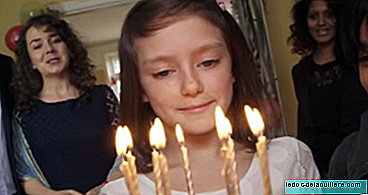
Yesterday I witnessed the tantrum of a girl who would not be more than three years old. The typical scene: supermarket queue, the mother makes him return the gum that had been self-served and bum !. It is as if he had pressed a button that exploded in a tantrum, with lollipop, crying and screaming included.
Tantrums are the manifestation of anger or frustration to situations that the child is not able to control. They appear around the year (it may be a few months before) and are more frequent between 2 and 4 years, at which stage they begin to develop their own independence and no longer accept so easily the control that others have over their lives or limits. that parents impose on them. Although tantrums also occur in older children, they are appeased as they grow and learn to handle things with greater "maturity."
When children are still young, they do not have the independence to do and undo as they please and are frustrated to see that there are things they would like but cannot do alone or that allow them, with the aggravating fact that they still do not explain it in words. When they are a little bigger, they do it as a way to challenge authority and demonstrate their own personality. While the tantrum lasts, it is a very stressful situation for both the child and the parents, and it is totally useless to try to convince them of something at that time. It is best to wait for the tantrum to pass without rejecting them and then explain. Leave them their space until it passes, but do not feel ignored. It is very common for tantrums to occur only at home but not at school, or vice versa. Or have them in the presence of the mother, but not the father, or vice versa.
It is a stage that the child will have to go through, and it is healthy, because it indicates that he is forming his own personality. The key is knowing how to handle tantrums so that the child does not use them to influence the parents or to get certain things.
For that reason, there is nothing left but to arm yourself with a lot of patience and follow some advice such as removing from your sight the things that you cannot touch, so as not to have to be telling them “that no” at all times. Give them the possibility of making small choices like "do you prefer to eat potatoes or spinach?" And fundamentally, to put clear guidelines, "no" means "no", not "maybe" and not a "not today, but tomorrow yes". Do not underestimate or belittle your tantrums.












